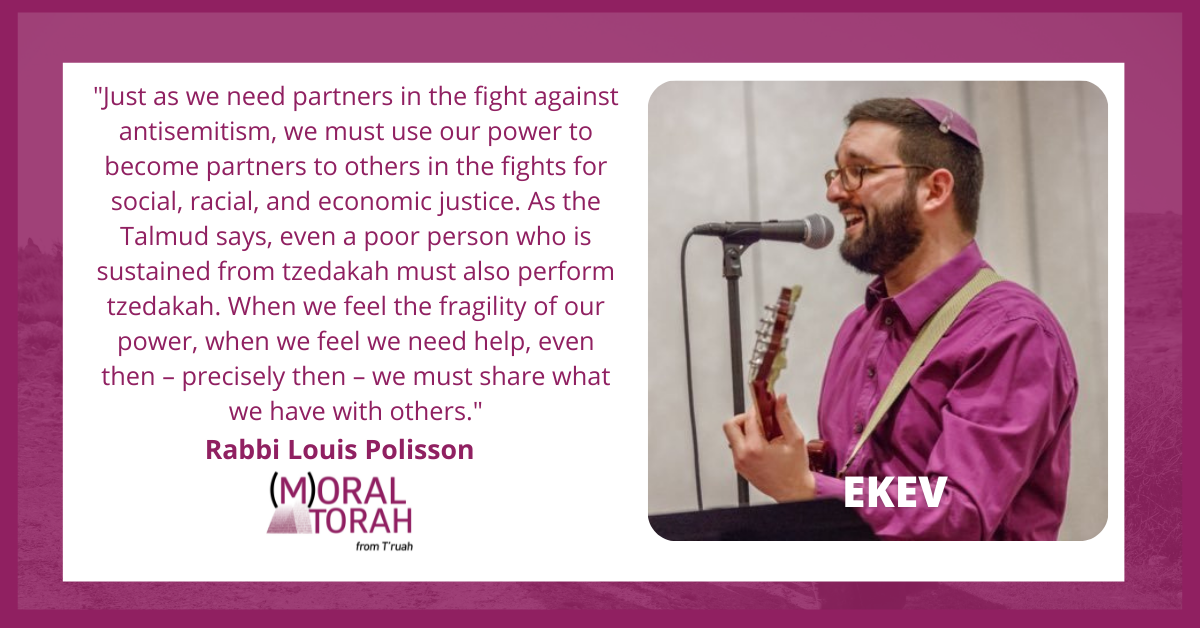A D’var Torah for Parshat Ekev by Rabbi Louis Polisson
This week, Moses is worried that once the Israelites have entered the Promised Land and have their basic needs met – their houses built, their fields full of flocks of cattle, plenty of gold and silver – they’ll become complacent, arrogant, and hard-hearted. He fears that the Israelites will say to themselves, “My own power and the might of my own hand have won this wealth for me” (Deuteronomy 8:17). Moses cautions the Israelites against this, saying: “Remember that it is Adonai your God who gives you the power to get wealth, in fulfillment of the covenant that God made on oath with your ancestors, as is still the case” (Deuteronomy 8:18).
The 18th century Moroccan rabbi Chayim Ibn Atar, the author of the Or Ha-Chayim, comments on this verse as follows: “Moses means that we must remember that the source of all the good that we experience is the Divine, and we must never forget it. If the Divine had not imbued us with strength we could never have achieved what we think we’ve achieved with our own power. Whenever people turn away from this truth… it is because they forget that their achievements are not truly their own. Such a path leads to a person’s eventual destruction.”
The Or Ha-Chayim understands that Moses was teaching the danger of haughtiness, the perilous falsehood that would become one of America’s core myths, the delusion of the “self-made man.” Moses knew that such arrogance and selfishness could tear a people apart. Instead, Moses sought to instill Jewish values of gratitude, humility, and justice in the descendants of the enslaved Israelites, empowering them so that they might build a just and equitable society in the Promised Land.
Sign up to receive (M)oral Torah in your inbox each week.
For American Jews in 2021, building that society means really internalizing the full range of our economic conditions. According to a 2020 Pew survey, at one end of the spectrum, American Jews are a relatively high-income group, with roughly half saying their annual household income is at least $100,000 – much higher than the percentage of all U.S. households at that level. And, at the other end, 26% of U.S. Jews taking the survey reported that, in the prior year, they had difficulty paying for medical care, their rent or mortgage, food, or other bills or debts.
As a historically oppressed people, many Jews live with inherited trauma. And as a people who have been encouraged – or in some cases, forced – to assimilate into Christian cultures, we live with hidden identities and lost memories. These inherited traumas have often kept us from heeding the Or Ha-Chayim’s words. Instead of remembering the resilience and humility of previous generations and the prophetic visions of solidarity, we “circle the wagons,” fearing that our power will be taken away. We even seem unable to fully recognize the extent of our power, and we struggle to discern the best way to use it – in part, due to our history of powerlessness. But if we understand that the Divine works through human beings at their best, then we can know that we experience Divine goodness – feelings of security and safety, blessing and abundance – through solidarity with others.
We can experience this when we share our wealth and power with others, and when we allow others to share their wealth and power with us – not only in material ways, but in the relational and spiritual realms as well. This means building relationships with individuals and groups outside of the mainstream centers of power. It means showing up even when it’s not comfortable. It means believing people when they report on their own experiences of poverty and oppression. And it means following their lead on questions of advocacy, action, and policy.
Find more commentaries on Parshat Ekev.
None of this means that we must deny or ignore the existence of both casual and violent antisemitism in the U.S., which are all too persistent. But the Torah teaches us that the particular and the universal are inextricably intertwined. Just as we need partners in the fight against antisemitism, we must use our power to become partners to others in the fights for social, racial, and economic justice. As the Talmud says, even a poor person who is sustained from tzedakah must also perform tzedakah (Gittin 7b). When we feel the fragility of our power, when we feel we need help, even then – precisely then – we must share what we have with others.
Otherwise, we may forget the real reason that our achievements, our wealth and power, are indeed fragile: Not because of antisemitism, or capitalism, or immigration, but because they are not truly our own.  As the Or Ha-Chayim teaches, forgetting this leads to a person’s – or a community’s – destruction. May we always remember that wealth and power are gifts that we didn’t earn alone, fortunes that we must not keep to ourselves alone. As the Torah commands: “Open your hand to the poor and needy kinsman in your midst.” (Deuteronomy 15:11) Wealth and power can never truly belong to one individual or group. They are sacred gifts that must always be shared.
As the Or Ha-Chayim teaches, forgetting this leads to a person’s – or a community’s – destruction. May we always remember that wealth and power are gifts that we didn’t earn alone, fortunes that we must not keep to ourselves alone. As the Torah commands: “Open your hand to the poor and needy kinsman in your midst.” (Deuteronomy 15:11) Wealth and power can never truly belong to one individual or group. They are sacred gifts that must always be shared.
Rabbi Louis Polisson serves as the spiritual leader of Congregation Or Atid of Wayland, MA. An alumnus of the JOIN for Justice Seminary Leadership Project and the Gladstein Fellowship at JTS, he is a musician, composer, and teacher of Jewish meditation. He also serves on the clergy advisory board of the Jewish Alliance of Law and Social Action (JALSA) and is a member of the T’ruah Boston cluster.

